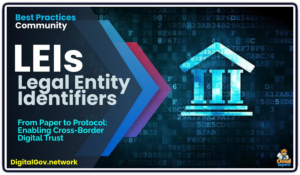 Legal Entity Identifiers (LEIs), unique 20-character alphanumeric codes assigned to legal entities engaged in financial transactions, serve as a foundational pillar for the digital economy by promoting transparency, interoperability, and efficiency across global systems.
Legal Entity Identifiers (LEIs), unique 20-character alphanumeric codes assigned to legal entities engaged in financial transactions, serve as a foundational pillar for the digital economy by promoting transparency, interoperability, and efficiency across global systems.
These identifiers enable precise identification of parties in digital transactions, which is critical for reducing fraud, building trust, and supporting robust regulatory oversight in increasingly complex digital markets.
Role of LEIs in the Digital Economy
By providing a standardized, globally recognized framework, LEIs facilitate seamless data exchange across jurisdictions and industries, from financial markets to supply chains, enabling efficient cross-border operations. Furthermore, LEIs enhance risk management and compliance by allowing regulators and businesses to track entities involved in financial activities, aiding in the monitoring of systemic risks, money laundering, and tax evasion.
In a digital economy characterized by rapid and intricate transactions, LEIs streamline compliance processes and support the integration of advanced technologies like artificial intelligence and blockchain, fostering innovation in areas such as automated Know Your Customer (KYC) processes and smart contracts.
As economies continue to digitize, LEIs provide an essential infrastructure for digital identity systems, underpinning secure and efficient interactions in e-commerce, digital payments, and decentralized finance.
Why Governments Should Have an LEI Adoption Strategy
Governments have compelling reasons to develop a strategic approach to LEI adoption to harness these benefits and strengthen their digital economies.
By mandating LEI use in regulated sectors such as finance and trade, governments can streamline financial regulation, reduce administrative costs, and improve the accuracy of reporting, as demonstrated in frameworks like the EU’s EMIR and the US’s Dodd-Frank Act. Encouraging widespread LEI adoption also enhances a country’s economic competitiveness by aligning with international standards, making it more attractive for global investment.
Additionally, LEIs contribute to financial stability by enabling better tracking of cross-border transactions and exposures, helping mitigate systemic risks in interconnected digital markets.
A national LEI strategy can further support innovation by embedding LEIs into digital identity systems, e-government platforms, and trade registries, creating a foundation for emerging technologies like blockchain and digital currencies.
To ensure broad adoption, governments could incentivize smaller entities through subsidies or tax benefits, reducing barriers to entry. By collaborating with the Global Legal Entity Identifier Foundation (GLEIF) and other jurisdictions, governments can harmonize LEI implementation, ensuring global interoperability.
In essence, a clear and proactive LEI adoption strategy positions governments to strengthen financial systems, drive innovation, and enhance their role in the global digital economy while addressing local economic priorities.




